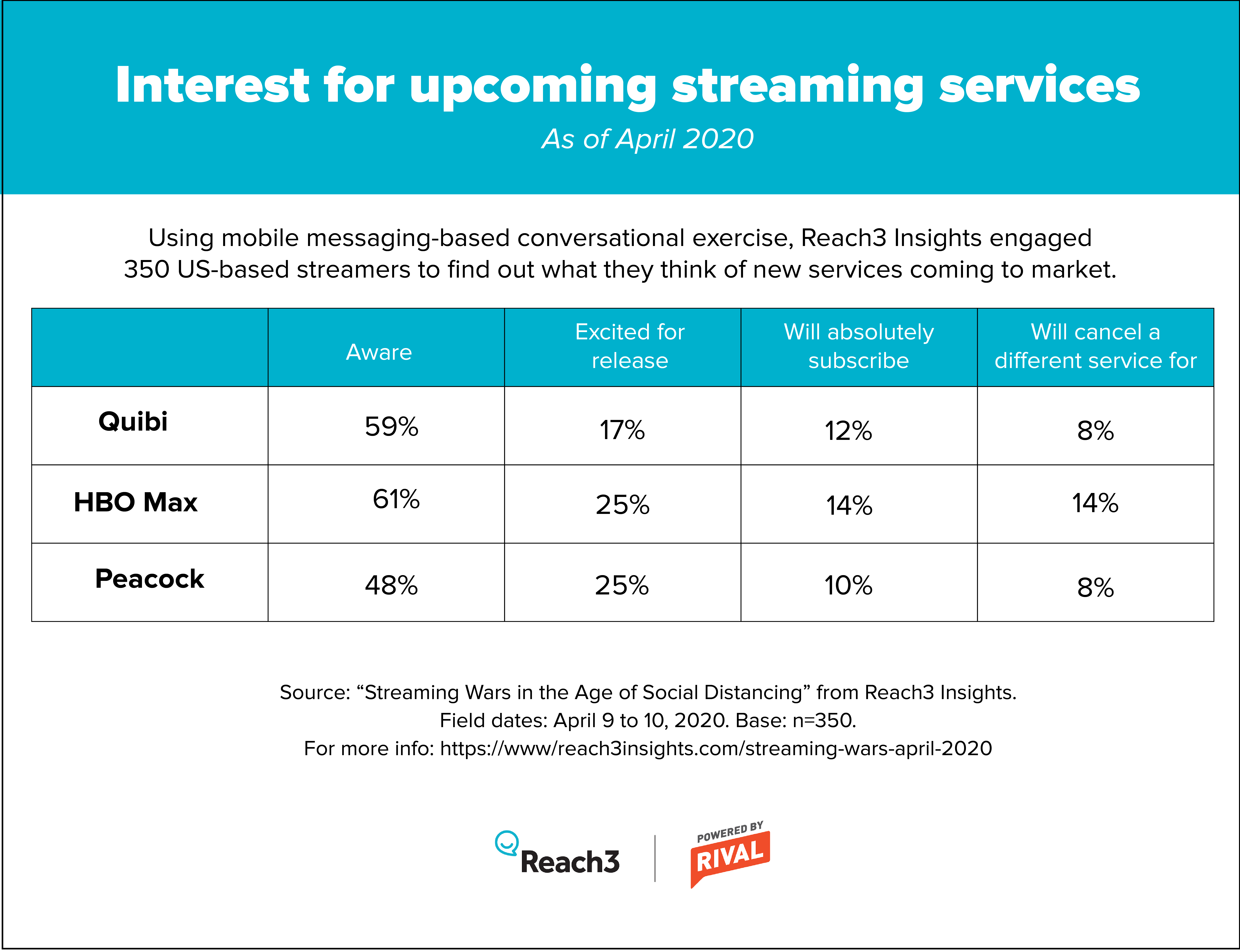Despite all these innovations and potential differentiators, people are still asking, “what exactly is Quibi?”
When Quibi launched in early April, it seemed like the company was off to a solid start. The newest player in the streaming business saw 1.7 million app downloads in its first week—an impressive feat given the increasing number of streaming services now available to consumers. With a $1.4 billion content budget and programming that includes A-list celebrities like Anna Kendrick, Jennifer Lopez and Chrissy Teigen, Quibi seemed poised for early success.
But in just a few weeks, Quibi’s download numbers have fallen like a rock. On social media, you’d be hard pressed to see any type of buzz for Quibi’s “bite-sized” shows. More telling is the fact that some of the company’s top executives—including its head of brand marketing—started leaving.
Quibi’s challenging launch is in stark contrast to Disney+, which recently reported that it has close to 55 million subscribers. But while it’s too early to call Quibi a failure, its rocky start also offers some key lessons for new players who want to enter an established market. Here are four takeaways marketers should take note of.
Clarify your positioning
Quibi is an audacious experiment. Its mobile-first content strategy, along with a business model that is both advertiser- and consumer-friendly, is something we haven’t seen yet in the streaming business. Quibi’s programming—focusing on daily 10-minute episodes—is also very different from what’s in the market today.
Despite all these innovations and potential differentiators, people are still asking, “what exactly is Quibi?” Is it an alternative to Netflix? Or is it more similar to the popular app TikTok?
Unfortunately, Quibi’s marketing efforts leading to launch did very little to answer these questions. During this year’s Oscars, the company created a series of quirky spots but failed to explain much about its service. The company’s slogan—Quick Bite. Big Stories—sounded grandiose but didn’t offer enough tangible details.
If your brand is new, it’s important to start with an understanding of what people don’t know yet about your product or service.
In marketing, it’s tempting to be clever, but sometimes a more straightforward approach is more effective. If your brand is new, it’s important to start with an understanding of what people don’t know yet about your product or service. Without insights on what consumers want to know, you’re at risk of creating campaigns that fail to move the needle.
Go beyond awareness
In a recent study from Reach3 Insights, we examined the impact of COVID-19 to the Streaming Wars. Using software from Rival Technologies, we leveraged mobile messaging-based exercises to engage 350 US-based consumers to find out their current streaming habits in the wake of social distancing. Quibi and other new streaming services naturally emerged as one of the big topics in this study.
We found that brand awareness is not a problem for new streaming services. More than six in 10 streaming users said they were aware of HBO Max, for example, while 59% said they have heard of Quibi. But this broad awareness is not translating to excitement or purchase intent. Among the streamers we engaged, 25% said they were excited for HBO Max and 14% said they would “absolutely” subscribe to this service. For Quibi, these numbers are lower: 17% said they were excited but only 12% said they would subscribe just after the services’ launch.

Given the increasing number of streaming players in the market, we also asked consumers if they would cancel another service to make room for newcomers. While 14% of streamers said they would consider abandoning another service in favor of HBO Max, only 8% agreed to the same statement about Quibi.
Awareness is a very important metric as you enter a new market, but you have to track other data as well. As this example shows, of particular importance is intent data relative to existing competitors. In established markets, at least some part of your customer base will come from incumbents. It’s critical to understand perceptions about the established players and the consumer needs that are currently unmet.
Adjust your strategy based on shifting consumer behaviors
When COVID-19 escalated, some people wondered if Quibi would go ahead with its scheduled launch. Founder Jeffrey Katzenberg admits pondering a delay, but ultimately he made the decision along with CEO Meg Whitman to march on.
One thing Quibi probably didn’t consider was people’s motivations for tuning in to streaming services while social distancing. In our research, we found that there were two powerful underlying motivations for the growth of streaming services in the wake of COVID-19: escapism and control. People were looking to relax and get their mind off of things, but at a time of so much uncertainty, streamers also want to have control over what to watch and when to watch.
Quibi’s one-episode-a-day strategy was meant to create stickiness—to give people a reason to open the app every day. But it’s an approach that didn’t jibe with current consumer sentiments. Our research suggests that people would rather get all of the episodes at once and determine for themselves when to consume that content. It would have been a smart move for Quibi to pivot and give people control over their own binge-watching habit.
All companies (but most especially new challengers) need to keep their pulse on what’s going on with consumers. The COVID-19 crisis makes this lesson painfully clear, but ongoing conversations with your audience is a good rule regardless of market conditions. Capturing ongoing insights about your customers can help you take advantage of shifts in consumer behavior before your competitors can.
Encourage your audience to share
Some of Quibi’s technical aspects make it difficult for streamers to talk about Quibi shows. Since the content is only available via a mobile app, people can’t live-tweet what they’re watching. (Quibi is promising to address this by adding TV casting soon.)
Quibi also disabled screenshot capabilities. So, if you’re seeing something funny or meme-worthy, there’s basically no way to tell your friends or followers about it.
Virality is important in the streaming wars. Netflix shows such as “Tiger King,” “Bird Box” and “Stranger Things” attracted big audiences because of significant social media buzz. Disney+’s “The Mandalorian” is another example of a successful streaming show that has benefited from memes. But by effectively discouraging viewers to share, Quibi has inadvertently made it impossible for its shows to generate buzz and go viral on social media.
The company even went so far as to send a cease and desist to a fan podcast dedicated to discussing Quibi shows and content, to limit how they could use the name or similar designs to Quibi. While there’s always a need to protect branding, making an enemy out of one of the few supporters seems to be exactly what not to do to build a community around your new service.
Regardless of your industry, you should think about ways of enabling your audience to talk about your products and services. Make it easy for people to generate word-of-mouth buzz for you and your brand—after all, this is free and powerful marketing that can help you reach new audiences.
Conclusion
With advertisers and investors backing it, Quibi should have the resources required to turn the ship around. A significant turnaround, however, requires ongoing research on shifting consumer sentiment, behaviors and attitudes. Urgency is required—with HBO Max and NBCU’s Peacock about to launch, the streaming war is about to get even more intense. Quibi is bringing interesting innovations to the entertainment industry, but it will need to make audience-centric decisions in the next few months to pose a real threat to Netflix, Amazon, Disney and other incumbents.
If you'd like to learn more about our study on the streaming wars, please feel free to reach out to our team directly.

Leigh Admirand
EVP & Founding Partner, Reach3 Insights







.webp?width=65&height=83&name=A-LIGN_HIPAA%20(1).webp)

